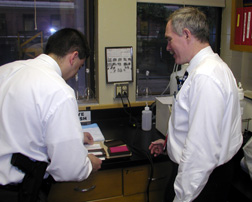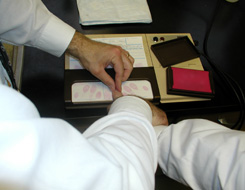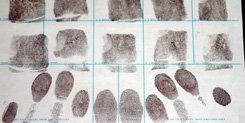 |
 |
 |
The FBI agent retrieved two sets of fingerprint samples from five personnel who will have access to regulated biological agents and toxins in the Nebraska Public Health Laboratory (NPHL) at UNMC.
“There are many federal mandates in reference to biological agents and toxins, but the issue is that personel who have access to these agents need to have a risk assessment done,” said Peter Iwen, Ph.D., assistant professor, pathology and microbiology, and associate director of the NPHL. “One requirement of the newest federal regulations deals with security which includes fingerprint analysis. We’re fortunate to have the assistance of local FBI agents.”
Under the Public Health Security and Bioterrorism Response Act of 2002, the U.S. Attorney General is required to assist the Department of Health and Human Services and the Department of Agriculture in denying access to facilities by persons who are considered restricted under the law. Pursuant to this responsibility, the Attorney General is collecting information for analysis of individuals from many sources. The fingerprint check aspect of this screening is coordinated through the FBI’s Criminal Justice Information Services (CJIS) Division.
Since 1988, UNMC has operated a BSL-3 (Bio-safety Level) laboratory, in which testing for highly infectious agents is conducted. Technologists within this lab are currently working with bacteria that cause tuberculosis, anthrax and tularemia, as well as conducting research on the diagnosis of other diseases including Severe Acute Respiratory Syndrome (SARS).
“Our BSL-3 lab is an isolated lab with increased security and restricted access as regulated by the FBI and Department of Justice,” said Tony Sambol, assistant director and coordinator of the NPHL’s Special Pathogens and Biosecurity Laboratories. “Background checks are done on any staff that work in the lab.”
After the fingerprint samples have been collected, they are immediately sent by the FBI to the CJIS Division in West Virginia for processing. Sambol and Iwen said that no UNMC employees have been unwilling to undergo the background checks.